高中英语人教版必修二教学案:Unit+2+Section+Ⅱ+Warming+Up+&+Reading+—+Language+Points.doc
- 格式:doc
- 大小:296.16 KB
- 文档页数:16
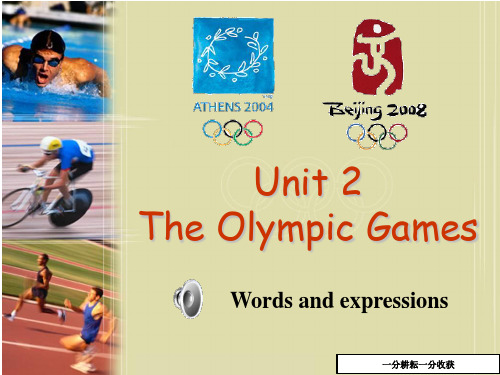
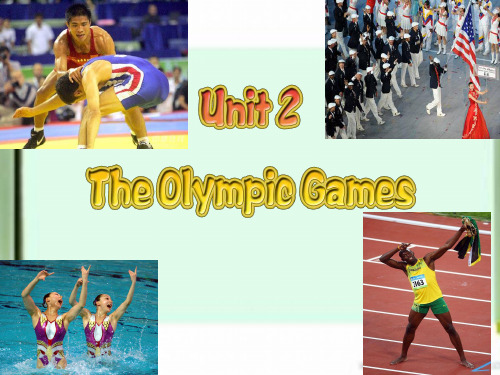
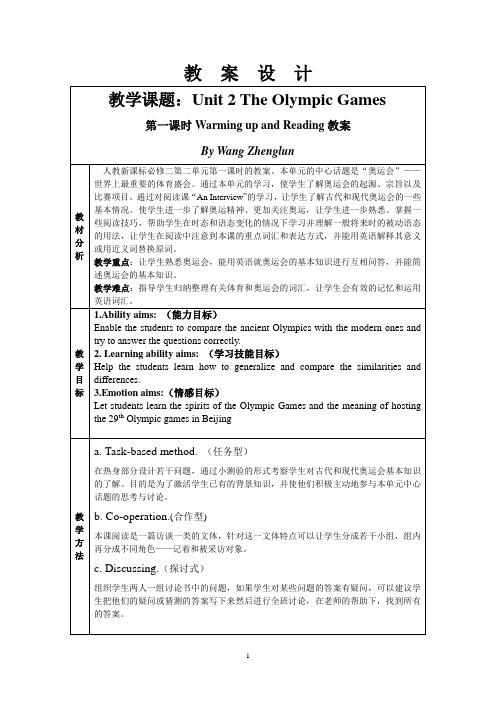
教案设计教学思路利用课件,展示一些2008年奥运会的激动人心的画面,让学生产生对本课学习的兴趣,激活学生的背景知识,让他们积极主动的参与课堂。
并创建问题让学生思考,并逐步引入课堂。
本课的设计内容分为以下几个部分:1、创设情境,设置问题,导入新课。
2、快速阅读课文,掌握文章大意;3、细读课文,抓住文章细节;4、讲解重点知识;5、巩固练习,复述课文;6、合作探究,知识升华。
7、课后作业布置说明。
教学过程1.Warming up:(热身)Before class I let students listen to the topic music of Beijing Olympic Games. At the beginning of the class.Good morning, everyone! Do you know the name of the music listened before class. “you and me”“very good!”Today we are going to learn about THE OLYMPIC GAMES. But first, I’d like to know how much you know about the Olympics held in Beijing. Anything about it is ok. Oh, Li Lei, do you want a try?…Right. You know so much about the Olympics. Then I give students some pictures of Beijing Olympics. Today, we’ll learn more about it in ancient Greece. Please finish Warming Up on page 9.1.Where did the ancient Olympics begin?2. Who could not take part in the ancient Olympic Games?3. When and where did the modern Olympics begin?4.What do the five rings on the Olympic flag stand for?5. Who was China’s first gold medal winner and for what event?6. What is the slogan of the Olympic Games of 2008?7. What are the official mascots for the Beijing Olympics?8. What are the famous buildings built for the Beijing Olympic Games?9. What is the motto of the Olympic Games? Swifter, Higher and Stronger T: Do you know all the facts? Let's find the answers together. The first one is 776 BC in Greece. If you are right, you can get 2 marks. Now I will show you the answers.If your marks are above 20, you are very familiar with the Olympic Games. If you get more than 10 marks, you know a lot about the Olympic Games. If your marks are between 5 and 10, you know some about it. But if your marks are less than 5, it shows that you don't care about the Olympic Games. So you need to learn a lot in this unit. Today we will learn more about it.2. Reading:Task1: Skimming for main idea. I give students several minutes to read the reading-text “An Interview ” silently and quickly to get the main idea of the text.The passage is an interview between Pausanias, a Greek writer and Li Yan, a volunteer for the 2008 Olympic Games. The interview is mainly about the similarities and differences about the ancient and modern Olympics.Task2:Read carefully and choose the best answer:1). Winter Olympic Games refers to Olympics Games____________A. that are held in winterB. that are held in cold weatherC. that are held on ice or snowD. that are held in fall2). Athletes are admitted to take part in the Olympics when they____________A. can reach the agreed standard for their eventB. pass an examC. are strong enough to compete in the gamesD. won champions in their own countries3). A special village is for the athletes____________A. to stay in and compete inB. to live in and have games inC. to practice inD. to stay in during the games4). Every county wants to host the Olympics for it will____________A. bring honor and prideB. bring moneyC. be easier to win medalsD. be more convenient for players5). How does Pausanias feel when he hears the Olympic Games are also about being able to ran faster, jump higher and throw further?A. surprisedB. happyC. sadD. embarrassed。
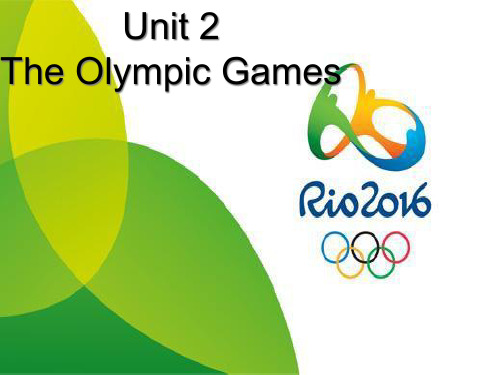
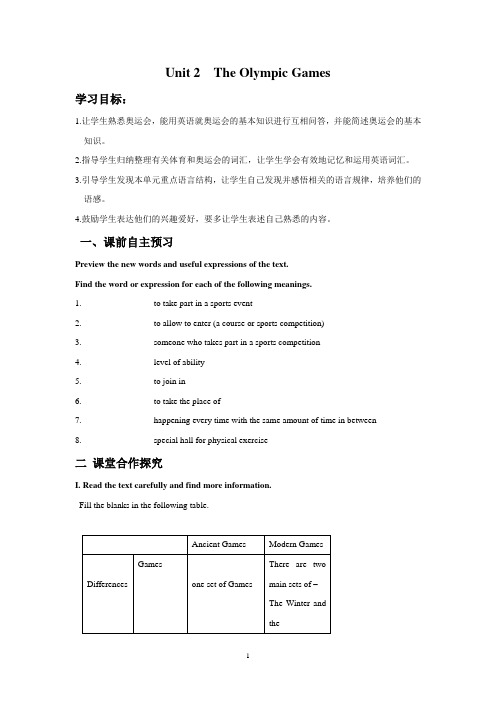
Unit 2The Olympic Games学习目标:1.让学生熟悉奥运会,能用英语就奥运会的基本知识进行互相问答,并能简述奥运会的基本知识。
2.指导学生归纳整理有关体育和奥运会的词汇,让学生学会有效地记忆和运用英语词汇。
3.引导学生发现本单元重点语言结构,让学生自己发现并感悟相关的语言规律,培养他们的语感。
4.鼓励学生表达他们的兴趣爱好,要多让学生表述自己熟悉的内容。
一、课前自主预习Preview the new words and useful expressions of the text.Find the word or expression for each of the following meanings.1.________________ to take part in a sports event2.________________ to allow to enter (a course or sports competition)3.________________ someone who takes part in a sports competition4.________________ level of ability5.________________ to join in6.________________ to take the place of7.________________ happening every time with the same amount of time in between8.________________ special hall for physical exercise二课堂合作探究I. Read the text carefully and find more information.Fill the blanks in the following table.II. Read the text for the third time.Task1.Read the first part (Line1-Line35) and decide whether they are true or false and give a reason.1. At first, Pausanias thinks athletes are invited from all over the world. ( )2. Pausanias is surprised to know that women are to take part in the modern Olympic Games. ( )3. Horse riding events belong to the Winter Olympics. ( )4. The village built for Olympic athletes is made up of a main reception building, several stadiums and a gymnasium. ( )Task2.Which sentence in the passage (Line 36-Line 53)can be replaced by the following one? Not only winning Olympic medals but also hosting the Olympics is a competition._______________________________________________________________________________ _______三、课后巩固训练(Fill in the blanks)WritingWhy do many countries want to host the Olympic Games while others do not? Write a passage to put forward your ideas and give reasons for your choice.1. Reasons to host the Olympic Games: a great honour; great responsibility; tourism…2. Reasons not to host the Olympic Games: too expensive; much planning; pressure…四、作业布置(Assignment):Discussion五、.课后反思(Self-examination):答案FTFF。
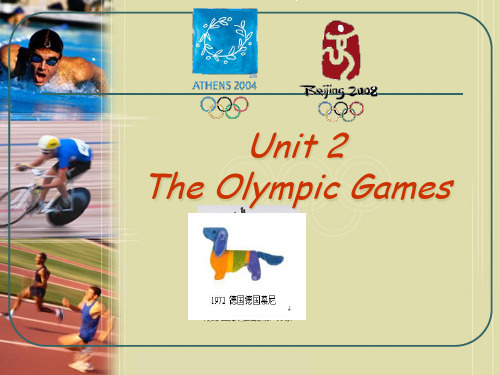
高一英语必修2第二单元Olympic Games第一课时教学反思文昌市田家炳中学吴花颜本课是高一英语必修2第二单元第一课时的内容,课型为阅读。
以下是我对本堂课的教学反思。
反思一:阅读材料的理解和阅读技巧的培养本节课课题奥运会为学生所熟悉,所以学生有话可说。
尤其是继2008北京奥运会之后。
所以学生对于本单元话题吸取较浓。
学生准备的也比较充分。
方便了教师的教学,同事对教师也提出了更多的要求。
传统的看法认为教师的任务就是传授知识, 按韩愈说的就是“传道授业解惑”, 但是仅仅传授知识是不够的。
要提高学生的素质, 就要培养学生的能力。
因此英语阅读教学中要突出“学”字, 从让学生“学会”转到培养学生“会学”, 授之以法, 把学习的主动权交给学生。
学会怎样学习, 对学生来说是至关重要的。
学生只有掌握了科学有效的学习方法。
在阅读课中,教授学生正确的阅读方法是非常重要的。
而我在这方面做得还不够。
阅读技巧的传授不是教师说一次学生就能接受掌握的,这种方法的传授要渗透在每次的阅读课的教学中,这样才能使学生形成良好的阅读习惯。
反思二:问题的设置问题设计是英语阅读教学的重要手段, 是帮助学生理解、鉴赏文章的切入点。
教师设计问题, 要遵循循序渐近的原则, 要把问题建筑在学生的注意力和兴趣之上,服务于全面提高学生素质水平的目标需要。
高中英语课文大多篇幅较长。
课文内容参透了丰富的审美以及科学教育内容。
在这些兼顾知识性、趣味性、思想性的阅读课教学中精心设计既有启发性又能激起学生探讨兴趣的系列问题, 可以启迪学生动脑, 激发学生思维,培养学生主动学习的习惯。
1以《我和你》2008北京奥运主题曲导入,大家一起唱,引起学生的兴趣,这部分做得很好。
2 Which number is concerned with the Olympic Games?FiveWhat do the five rings stand for?The five interlocking rings stand for friendship of five continents.3 talk about 2008 Beijing Olympic mascot 这部分做得很好4 the Olympic motto and 2008 Beijing Olympic motto5 talk about the events of the Olymic games6 How much do you know about the Olympic Games? Test your knowledge with this quiz in warming up7 Fast reading (Tor F)8Careful reading9 Tell the difference between ancient and modern Olympics according to the reading passage and fill in the blank,让学生上黑板来完成,这部分做得很好。
Unit 2 The Olympic Games,Book 2Period 1: Warming up and reading★Learning Aims:1.Knowledge aims:To learn about some basic knowledge of the ancient and modern Olympic GamesTo master the new words and expressions in this passage2.Ability aims:T o understand the general idea of the new text to train the reading ability of the studentsTo be more familiar with some reading skills ,such as scanning ,summarizing etc.3.Emotional aims:To arouse the students’ interest in the Olympic Games and get them to understand the Olympic spirit better.★Key points:To understand the general idea of the textTo improve the students’ reading ability further★Difficult points:To retell the textTo use words and expressions learnd in this text to communicate freely.★Teaching methods:Task- based teaching and the integral teaching method★Learning methods:To use some reading skills to understand the text betterTo be more active in group activities★Teaching aids: multimedia a tape recorder★Teaching and learning Procedures:StepI. Warming upLead in the lesson by showing the students a short movie about the 2008 Beijing Olympic games.Warming up by checking the preview plansToday we are going to learn about THE OLYMPIC GAMES. But first, I’d like to know how well you have prepared for the class…now, take out your preview plans. Check the answers to the exercises on the prewiew plans with the whole class.Get the students to raise the difficulties or problems they met with in their previewing. StepII. ListeningLook at the title and the pictures and predict the content. Then listen to the tape carefully and see if you were right. Then try to get the general idea of the passage.After listening,ask:Have you got the main idea?①Step III.Fast readingNow read the text quickly and silently. The boys shall try to finish the task: What was the ancient Olympics like? The girls shall try to finish the task: What is the modern Olympics like?Then talk about the similarities and differences between the ancient and modern Olympics.②StepⅣ.Careful readingRead the text more carefully and finish two tasksTask 1 Decide which are true and which are false:③1.There are two sets of Games- the Summer and the Winter Olympics and both are held every four years.( )2. The Winter Olympics are usually held two years after the Summer Olympics.( )3. Slaves and women were allowed to take part in the Games.( )4. The 2004 Olympics were held in Greece.( )5. People in the modern Olympic Games compete for money.( )Task2. Ask and answer :SB, P11 Ex2.StepV. RetellingRetell the text according to the following key wordsT he ancient Olympics…every four years…be not allowed to…the modern Olympics ..two sets of…not only…but also…the opportunity to …compete for …the motto……StepVI ExerciseF ill in the blanks:④The _______Olympic Games began in Greece and were held from 776 B.C. to A.D.393. It was held_______ four years. At that time, there were not so many sports as today. And women were not________to take part in the games. There were not Winter Olympics at that time. Winners got the________wreath as the prize. .The_______ Olympic Games began in 1891. They’re held every four years. There are two sets of Games ----the Winter and the Summer Olympics.In the summer Olympics there are over 250 different sports. Women are_____ ______ allowed to join in ______ play a very important role. Now the competitors compete for medals. The motto is _____ ______and_______.Step VII .DiscussionDiscuss this question in groups:Why do many countries want to host the Olympic Games while others do not. Then prepare for a class discussion..StepVIII. SummarySum up the lesson by a quiz about the Olympic games1.What’s the name of the country where the first Olympics began?2.What’s the large building called in which many outdoor sportsevents are held?3.What’s the Olympic motto?4.This is an award giwen to the top threewinners in each event in the Olympics?5.how often are the Olympic Games held?StepIX HomeworkTask 1 Translate the following phrases1. _______________ 每四年2._______________ 扮演角色3. _______________ 为了……荣誉4. _______________ 一套5. _______________ 与……结婚6. _______________ 改变主意7._______________ as well 8. _______________ one after another9. _______________take part in 10. _______________ as a matter of fact11. _______________be admitted as 12. _______________be admitted to/into13. _______________compete against sb 14. _______________take part15. _______________join in 16. _______________ 古代奥运会17. _______________冬奥会18. _______________夏奥会19. _______________奥运会Task2 Multiple choice1. The games which the young man were difficult to play.A. take part inB. attendedC. joinedD. joined in2. Have you heard of Oxford University? It’s _______ to be quite a famous one.A. saidB. toldC. spokenD. talked3. The harder you , the better progress you .A. will work; will makeB. work; have madeC. work; will makeD. will work; make4. Make sure that the windows before you .A. are shut; leaveB. were shut; leaveC. will be shut; leftD. have been shut; left5. In the last World Cup Competition, the German Women Team all the other womenteams and the world championship.A. won; wonB. won; gotC. beat; wonD. beat; received6. “You can’t catch me!” Janet shouted, away.(2005.NMET3)A. runB. runningC. to runD. ran7. Tom: Mike, our team will play against the Rockets this weekend. I’m sure we will win.Mike: ! (2005. 广东)A. Good luckB. CheersC. Best wishesD. Congratulations8. On May 5,2005, at World Table Tennis Championship, Kong Linghui and Wang Hao won the gold medal in men’s doubles with score of 4:1.(2005.江苏)A. a; aB. /; theC. a; /D. the; a9. Bob ran the 100 metres in 9.91 seconds, and I have not seen one this year.(2005.浙江)A. the best B. a better C. the most D. more10. Bread and butter at the restaurant. It is unnecessary to go out for breakfast.A. are servedB. servesC. is servedD. serveo1. Asking and answering w, please read the three questions before the Reading. Let’s do it in turn. Let’s begin from the first row here…ok, you did a good job. Let’s summarize your answers.2. Imaging and introducingPlease look at the three pictures in the reading. Please talk about them. Imagine whatever you can.3. Talking and SharingWe know there are many differences and similarities about the ancient and modern Olympics. Do you know anything about them? You can simply guess. Yes, Lucy, try …III. Reading1. Reading aloud to the recording and finding the general ideaNow please listen and read aloud to the recording of the text AN INTERVIEW. Pay attention to the pronunciation and intonation as well as the pauses within each sentence. Then try to get the general idea of the passage. Have you got the main idea? Yes, it tells us the differences and the similarities between the ancient and modern Olympics.2. Reading and actingNow let’s play the parts of the Greek writer Pausanias and the Chinese girl Li Li. Now boys, you are Pausanias; girls, you are Li Li. Please pay attention to the bold words.3. Reading and findingNow read the text again. The boys shall try to finish the task: What was the ancient Olympics like? The girls shall try to finish the task: What is the modern Olympics like?4. Reading and collecting informationOk, now let’s read it silently. First let’s talk about the same points between the ancient and modern Olympics. Who can answer? Any volunteers?Then let’s come to the differences.5. Reading and underliningNext you are to read and underline all the useful expressions or collocations in the passage. Copy them to your notebook after class as homework.ⅣClosing downClosing down by doing exerciseTo end the lesson you are to do the comprehending exercises 1 & 2.Closing down by discussingYou know our government has tried its best to compete for hosting the 29th Olympic Games. It has cost a lot of money. Do you think it is worthwhile? Why?Closing by imaginingImagine what we will do and what we can do for the 29th Olympic Games now.Closing down by narratingWe can see the text is written in a conversational style. And there are two speakers.One is Pausanias, a Greek writer 2000 years ago, the other is Li Li, a Chinese girl. Now let’s change it into a narrative style. In other words, let’s describe the ancient and modern Olympic Games in our own words. Who would like to have a try?Closing down by summarizingAs we have finished the passage we’ll sum up what we have learned. First let’s see the writing skills. It is written in a conversational style. It’s in a very interesting way. It adopts a dialogue between Pausanias who lived 2000 years ago and a Chinese gird in modern world. Through their dialogue, the differences and similarities between the ancient and modern Olympic Games are made known to the readers. Just because it is in a conversational style, there are quite a few oral spoken English and elliptical phrases.Through the comparison between the ancient and modern Olympic Games, we have learned the differences and the similarities between them. Now we can have a deep understanding of the Games. From the passage, we can have a deep understanding of the Games. From the passage, we can also get to know that the Olympic Games are developing and improving. It’s our duty to make the Olympic Games better and healthier. We know that one of the slogans for 2008 Beijing Olympic Games is Green Olympic Games. It shows that people are paying more and more attention to ourenvironment.Period 2: Learning about LanguageTeachin Aims:To learn about future passive voiceTo discover useful words and expressionsTo learn the methods of words formationProceduresI. Warming upWarming up by dictatingThere are several important sentences in this unit. Let’s dictate them. If you ca n’t, learn them by heart after class.①When and where will the next Olympic Games be held?②I live in what you call “Ancient Greece”and / used to write about theOlympic Games more than 2000 years ago.③All countries can take part if they reach the standard to be admitted tothe games.④The next Olympic Games will be held in my hometown.⑤It is just as much a competition among countries to host the Olympics asto win an Olympic medal.Warming up by discovering useful words and expressionsTurn to page 12 and do exercises 1, 2 and 3 first. Check your answers against your classmates’.II. Learning about Present Future Passive VoiceTurn to page 13 and do exercise 1. And tell the class the formation of present future passive voice.III. Closing down by summarizing1.Present future passive voice (take “ask” for example)2.The passive V oice of phrasal verbGenerally speaking, only transitive verbs can form the passive voice, for only transitive verbs can be followed by objects. But many intransitive verbs together with some prepositions and adverbs can be used as transitive verbs. So they can also be followed by the objects. Therefore they can also be used in passive voice.But note that all the phrasal verbs are used as a whole. When using them in passive voice, we cannot drop out the prepositions and adverbs. For examples:At last they put out the fire. At last the fire was put out.They will put up a notice on the wall. A notice will be put up on the wall.Have you sent for a doctor? Has the doctor been sent for?I have never heard of such a thing before. Such a thing has never been heard of before.We must take good care of the children here. The children must be taken good care of here.His classmates laughed at him for the foolish mistake. He was laughed at for the foolish mistake by his classmates.Period 3: using languageTeaching Aims:To read about the ancient Olympic GamesTo listen and talk about hobbiesTo write about hobbiesProcedures1. Warming upWarming up by introducingHi! Class. You know Greece is the world-known country with an ancient civilization. It has a long history with so much marvelous culture. The Greeks had wonderful stories about the Gods and Goddnesses who were part of their religion. They believed that these god or goddesses would help humans if they felt sorry for them or if the humans were good people. However, the Gods did not always help. They behaved like people who were unpredictable and capricious. To try to get the support of the Gods people had to pray to them and offer them present. In this story the Goddess Hera, the wife of the chief God, Zeus was sorry for Hippomenes and agreed to help him. Warming up by sharingNow, boys and girls. Is there anybody who can tell us some Greek mythology. You know they are so famous in human history. Or can you speak out some names of Greek Gods and Goddesses.Ⅱ. Guided reading1. Reading and judgingRead the text THE STORY OF ATLANTA, and complete the True or False guestions after the text on page14.2. Reading and Telling True of FalseRead the text and finish exercise 1 on page14.1. She practiced running to compete in the Olympic Games. ( F )2. At first Hippomenes understood why men ran against Atlanta. ( F )3. Atlanta was not sure she could win. ( F )4. She was so angry about the fact that she could not run in the Olympics. ( T )5. She made as many men as she could share her pain. ( T )6. Her father did not understand her wish to compete in the Olympics. ( T )7.He did not refuse her wish to choose her husband in a race. ( T )3. Reading and underliningNext you are to read and underline all the useful expressions or collocations in the passage. Copy them to your notebook after class as homework.4. ListeningFor listening turn to page 15 and be ready to do exercises 1.First read the statements carefully and imagine what is the listening about.When doing it , you must make clear the order of them.5. ActingNext we are going to put the text A STORY OF ATLANTA on stage. You know there are four charactors in the story. Who would like to be them?Who will be Alanta’s father, the old king?Who will be the Goddess of Love?Ok. Li Li, you are the Greek princess. Zhang Qiang, you are the brave young manHippomenes. Lucy, you are the Goddess of Love. Zhou Gang, you are the princess’s father. The rest of class, please prepare it in groups of four. Then act your play before class.6. SpeakingNow, class. Let’s carry out a survey of the interests in the class and write down the names of the classmates who have the same interests. You can carry out the task like this.Which do you like, sport, music or collection?Which of the sports do you like best?What is your favorite sport?Are you interested in table tennis?After the survey, the ones who have the same interests sit together and please work in groups of four to talk about their interest.III.Guided writing1. Writing an imagined dialogueGroups 1 and 2 are going to write an imagined dialogue between the princess andHippomenes. You may begin like this : Oh, my dear princess, I want to marry you…2. Writing a descriptionTurn to page 16 and follow the direction to write a description of your favorite hobby. Here is an example:IV. Closing down by finding informationGo to the library to read or get online to search in order to find more information on the Olympic Games and the ancient Greek mythology. Take notes of your finding and report to your groupmates next Monday morning.。
Section_ⅡWarming_Up_&_Reading_—_Language_Points一、这样记单词记得准·写得对记得快·记得多Ⅰ.基础词汇1.medal n. 奖章;勋章;纪念章2.stadium n. (露天大型)体育场3.motto n. 座右铭;格言;警句4.swift adj. 快的;迅速的5.host v t. 做东;主办;招待n. 主人6.ancient adj. 古代的;古老的Ⅱ.拓展词汇pete v i.比赛;竞争→competition n.比赛;竞争→competitor n.竞争者→competitive adj.有竞争力的2.magical adj.巫术的;魔术的;有魔力的→magic n.魔术;魔力→magician n.魔术师3.volunteer n.志愿者adj.志愿的;义务的v.自愿→voluntary adj.志愿的;义务的4.regular adj.规则的;定期的;常规的→regularly ad v.定期地;规则地5.basis n.基础;根据→basic adj.基本的;基础的6.athlete n.运动员;运动选手→athletic adj.运动的7.admit v t.&v i.容许;承认;接纳→admission n.准入;准许8.slave n.奴隶→slavery n.奴隶制度1.replace v t.取代;替换;代替[记法]re(重新)+place(位置;放置):重新放置别的东西即“取代”。
[同义]take the place of, in place of, instead of, displace2.“快的;迅速的”多种表达①swift②quick③fast④rapid3.homeland n.祖国[记法]home(家)+land(土地)→homeland n.祖国[联想]常见的合成词①mother(母亲)+land(土地)→motherland n.祖国②foot(脚)+ball(球)→football n.足球③book(书)+shelf (架子)→bookshelf n.书架④earth(地球)+quake(颤抖)→earthquake n.地震4.“比赛”相关名词荟萃①athlete运动员②medal奖牌③competitor竞争者④champion冠军⑤coach教练5.动词+后缀(s)sion变成名词①admit (v.)容许→admission (n.)准许②permit (v.)允许→permission (n.)许可③decide (v.) 决定→decision (n.) 决心④express (v.)表达→expression (n.)表达⑤discuss (v.)讨论→discussion (n.)讨论6.加词缀ir-/im-变为反义词①regular→irregular adj.无规律的②possible→impossible adj.没有可能的③polite→impolite adj.无礼的9.responsibility n.责任;职责→responsibleadj.有责任的;负责的二、这样记短语记牢固定短语多积常用词块1.take_part_in参加;参与2.stand_for代表;象征;表示3.as_well也;又;还4.as_a_matter_of_fact事实上;实际上5.be_admitted_as被作为……接受6.play_a_very_important_part/role_in 在……中起重要作用7.compete_for为……竞争/比赛8.compete_against与……竞争/比赛1.gold medal金牌2.the motto of the Olympics 奥运格言3.every four years 每四年/每隔三年4.reach the agreed standard 达到统一的标准5.not only ...but also ... 不但……而且……6.a great honour 极大的荣誉7.regular basis 常规基础8.all about 一切为了三、这样记句式1.(教材P9)How many countries competed in the ancient Olympic Games?古代奥运会有多少国家参加?compete vi.比赛;竞争我儿子被选拔出来参加伦敦的马拉松比赛。
②Only by competing with/against each other can we make great progress in our study.只有相互竞争,我们才能在学习上取得巨大进步。
③The two players competed with each other for a gold medal.这两个运动员为金牌而战。
④More than 1,000 competitors (compete) took part in the competition (compete) to compete for the first prize.1 000多名参赛者参加这项竞赛,竞争第一名的位置。
2.(教材P9)Who could not t ake part in the ancient Olympic Games?谁不能参加古代奥运会?take part in参加;参与①Many athletes are dreaming of taking part in the Olympic Games and winning gold medals for their homeland.许多运动员梦想着参加奥运会,为他们的祖国争夺金牌。
taking an active part in social activities.妇女现在正积极参加社会活动。
[辨析比较]take part in, join, join in, attend选用上述词语填空③Will you take_part_in the English evening party with us?④Will you all join_in singing the song, please?⑤I will attend my cousin's wedding ceremony next Friday.⑥It is five years since he joined the army.3.(教材P9)What do the five rings on the Olympic flag stand for?奥运旗上的五环代表什么?stand for代表;象征;表示;主张;容忍我主张人人都有言论自由。
②Don't lose heart; all your friends will stand by you.不要灰心,你的所有朋友都会支持你。
③Wearing a fancy skirt, the girl always stands_out in the crowd.穿着花哨的裙子,这个女孩在人群中总是很显眼。
[名师点津]stand for作“代表”讲时,不用于进行时态和被动语态。
4.(教材P9)He is now interviewing Li Yan, a volunteer for the 2008 Olympic Games.现在他正在采访一位2008年奥林匹克运动会的志愿者李燕。
volunteer n.志愿者;志愿兵adj.志愿的;义务的vt.& vi.自愿女孩代替哥哥成为志愿者参加了这项体育赛事。
②The couple often volunteer to_take (take) part in activities helping those in trouble.这对夫妇经常自愿参加帮助有困难的人的活动。
③I do some voluntary (volunteer) work at the local hospital.我在当地医院从事一些义务工作。
5.(教材P10)Only athletes who have reached the agreed standard for their event will be admitted as competitors.只有达到他们各自项目统一标准的运动员才会被接受参加奥运会。
admit vt.& vi.承认;容许;接纳女仆人承认是她拆开了木箱。
②Through his hard work, he was admitted into/to the key university last year.通过他的勤奋努力,去年他被那所重点大学录取了。
③The man admitted stealing/having_stolen (steal) a collection of valuable paintings.这个人承认偷了一批珍贵的油画。
④You must admit the man to_be (be) stubborn.你必须承认这个人是顽固的。
[名师点津]admit后跟动名词但不能跟不定式作宾语。
6.(教材P10)For each Olympics, a special village is built for them to live in, a main reception building, several stadiums for competitions, and a gymnasium as well.每届奥运会都会有一个特殊的村庄(奥运村)供参赛的人住,一个主要的接待大楼,好几个供比赛用的体育场,还有一个室内体育馆。
as well也;又;还他也被选去参加奥运会。
②Many students as well as Tom were (be) present at the meeting.汤姆和许多学生都参加了会议。
③Now that you have a good chance, you may/might_as_well make full use of it.既然你有一个好机会,你不妨充分利用这次机会。
7.(教材P10)It's a great responsibility but also a great honour to be chosen.被选中不仅要承担巨大的责任同时也享有极大的荣誉。
responsibility n.责任;职责这将有助于帮助他们从小建立责任感。
②You are in charge of the company, so you should take_responsibility_for what you said.你负责这家公司,所以你应该为你所说的负责。